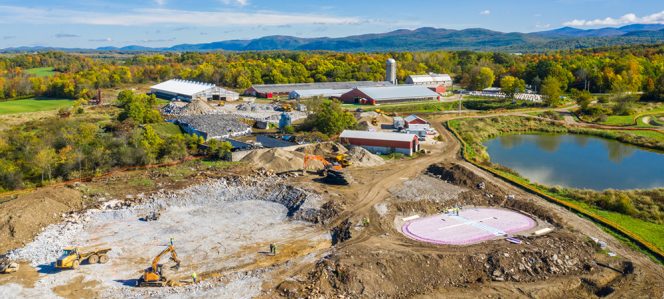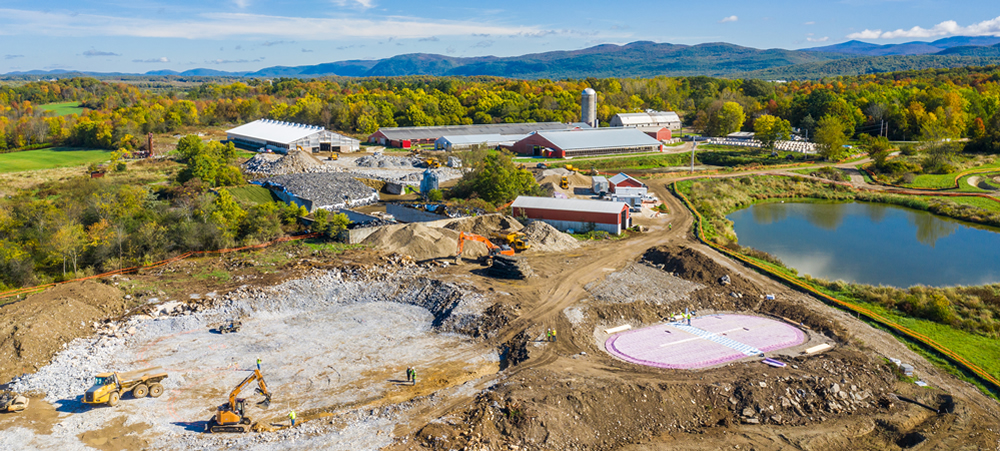Strategic partnership between Dominion Energy and Vanguard Renewables to build dairy digesters to produce RNG.
Nora Goldstein
On Dec. 11, 2019, Dominion Energy (Dominion) and Vanguard Renewables (Vanguard) announced a more than $200 million, nationwide strategic partnership to build manure-only anaerobic digesters that produce renewable natural gas (RNG) on U.S. dairy farms. Under the strategic partnership, Dominion Energy will own the projects and market the RNG; Vanguard Renewables Ag, a subsidiary of Vanguard, will design, develop and operate the projects.
Dominion and Vanguard have a strategic alliance with Dairy Farmers of America (DFA). The first round of projects are being developed in Georgia, Nevada, Colorado, New Mexico and Utah. “DFA was integral in our decision to target these states, which have the density of dairies we need for digester development and RNG production,” explains Kevin Chase, Vanguard’s cofounder and chief investment officer. “We are seeking clusters of dairies with a minimum combined total of 20,000 to 30,000 cows to capture the amount of manure needed to make the infrastructure investment.”

Smith Valley Dairy in Nevada will host a Farm Powered anaerobic digester as part of the Vanguard Renewables-Dominion Energy partnership. Image courtesy of Vanguard Renewables
The initial $200 million will fund about 15 digester/RNG facilities over the next 3 to 5 years, adds Ryan Childress, director of Dominion’s gas business development. “Our investments in RNG are an important part of our company’s comprehensive clean energy strategy. We have made significant investments in solar and offshore wind, and we are very bullish on the future of RNG. I believe Dominion is leading the way in helping the broader industry recognize the benefits of RNG — both operationally and in terms of sustainability. RNG is a really good product, and we are getting better every day at supplying it.”
The dairy digesters that Vanguard has built and operates in Massachusetts codigest food waste and manure. For the new partnership with Dominion, however, it was decided to start with manure only. “From Dominion’s standpoint, we want to get really good at one thing first and then scale it,” notes Childress. “We know, from participating in the ag sector with both dairy and swine manure, that the gas quality is strong and consistent.”
Chase adds that to successfully collect and process food waste streams, it’s necessary to be near metropolitan areas where the food waste is generated. “In some places where we are planning facilities with Dominion, the food waste sources are too far away. But we are not ruling it out.”
He also notes that manure-only projects and partnering with Dominion give Vanguard an opportunity to expand into the more lucrative D3 RINs market under the Renewable Fuels Standard. (Vanguard’s projects in Massachusetts generate electricity, and the company is entering the RNG space with a new codigestion facility in Vermont.) Codigestion projects that include food waste are only eligible for D5 RINs, which have a much lower value than D3 RINs. (In early February, a D5 RIN had a value of around $0.45 cents/RIN; D3 RINs are around $1.55/RIN, according to EcoEngineers, which tracks RIN prices on a daily basis.)
Logistics
In 2018, Dominion Energy joined forces with Smithfield Foods to form Align RNG, the largest agricultural-based RNG partnership in the U.S. The companies committed $500 million over 10 years to convert methane from hog farms into RNG. In the Align RNG model, contract farmers (raising hogs for Smithfield Foods) “want to own the assets,” explains Childress. “They are investing the capital and getting paid for the RNG. Align RNG pays for the biogas-to-RNG conditioning system and the pipeline interconnection. With the dairy farms, Dominion is financing and owning the digesters. In actuality, the business models are pretty similar. The farms are just monetizing different parts of the operation, and in both cases, still get access to the nutrients.”
Adds Chase: “We are still doing a lease with the dairies to locate the digesters on their farms. But we also have a manure supply payment — essentially we are paying the dairy to process their manure to generate biogas. The farmers bring the manure to a collection point, e.g., a manure pit, and then take the digested solid and liquid byproducts of the process at the back end for their own use.”
Climate will play a big part in the selection of the digester system, notes Chase. For example, in New England, Vanguard uses CH4 above ground tank digesters, which facilitates heating during cold weather seasons. In warmer climates, it may be more feasible to use covered lagoons.

Vanguard Renewable’s codigestion-to-RNG facility under construction at Goodrich Farms in Salisbury, Vermont. Image courtesy of Vanguard Renewables
RNG Customers
Biogas from the dairy facilities will be transported through low-pressure gathering lines to a central conditioning facility. The gas will be processed and cleaned, and the RNG injected into local distribution company pipelines or a central pipeline. “We’ve seen a lot of consumer interest in RNG because it is combines the environmental benefits of renewables with the reliability of natural gas,” explains Dominion Energy spokesperson Aaron Ruby. “That’s very appealing to gas utilities, large industrial customers and even colleges and universities that have aggressive carbon reduction goals,” Ruby added. “Because RNG captures 25 times more emissions than it releases, a utility or other gas user can effectively achieve carbon neutrality by sourcing just 4 percent of their gas supply from RNG.”
Chase notes the “really interesting nexus occurring where RNG is being acknowledged as a great source of sustainable energy and farm-based anaerobic digestion getting more sophisticated in its operations. “Vanguard Renewables has north of $100 million invested in the space,” he says. “We have teams of biologists, chemists, engineers, organics management staff, and more. It is a really cool nexus.”
Both Vanguard and Dominion anticipate the RNG market will be a combination of voluntary purchase programs with residential, institutional, commercial and industrial accounts, and utility obligations to green the natural gas supply due to state renewable energy and fuel policies. In some cases, RNG purchases are in response to corporate commitments to achieve voluntary carbon offsets. “Colleges and universities are leading the way in non-obligated requirements,” notes Chase. “And a lot of utilities and multinational energy companies have to meet Public Utility Commission obligations and other renewable energy requirements.”
For Dominion Energy, getting long-term voluntary offtake contracts is crucial to scale the RNG industry. “When we find parties interested in locking up a long-term deal, that is good,” says Childress.
All in all, he adds, the cross industry nature of Dominion’s partnerships with Smithfield Foods and Vanguard Renewables is innovative. “Ag companies and energy companies are teaming up to create a new industry. We all are taking an idea and running with it.”











